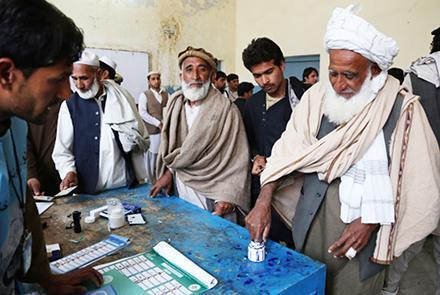A number of Afghanistan’s political parties and mainstream on Tuesday, reacting to the new announced delay in the schedule of the presidential elections by the election commission, said the election delay is against the Constitution.
The political movements' remarks come after, on Sunday, the election commission said the election management body had decided to hold the country’s presidential elections in July this year.
Afghanistan’s presidential elections were supposed to be held on April 20.
Reacting to the new elections schedule, Mehwar-e-Mardum-e-Afghanistan political group said the delay in elections will provide the chance for government to engineer them.
According to Mehwar-e-Mardum-e-Afghanistan, the delay in the elections has not been made to bring reforms to the election commission, but to provide context for interference in election affairs by government.
“The delay is made more to provide the context for interference and engineering the presidential elections, rather than bringing reforms in the commission. If reforms were the issue, the National Unity Government had lots of time to bring them about in the election commission and electoral system,” Daud Ali Najafi, head of electoral committee of Mehwar-e-Mardum-e-Afghanistan said.
The Wefaq Millie Party meanwhile warned of negative consequences in delaying elections and blasted the election commission over lack of plans for managing electoral affairs.
They insisted that the upcoming presidential elections should not have the same fate as the October 20 and 21 parliamentary elections and 2014 presidential elections.
“People of Afghanistan are concerned with this commission and this government, and are in a legal vacuum as to how this election will be conducted and whether people can accept the results,” Ahmad Wali Massoud, head of the Wefaq Millie Party said.
The spokesman for the office of Mohammad Hanif Atmar, the former national security advisor and a possible presidential candidate, meanwhile said in a statement that the work of National Unity Government after May 2018 does not have political and legal legitimacy.
According to Atmar’s office, delaying elections will increase people’s distrust, adding that the election commission does not have the capacity to hold four elections together.
The election commission this week said they would hold the presidential elections, district council elections, Ghazni parliamentary elections and the provincial council elections together in July.
The Presidential Palace meanwhile has said that determination of the elections schedule is the authority of the election commission and the government has not interfered in the commission’s decisions.
The election commission also said they make decisions independently and accept no interference.
“After seeing our problems and prolonging of October 20 and 21 parliamentary elections and the lessons that we learned for this election, we (felt that we) need more time. We shared the issue with government, donors, political parties and politicians and consulted them on the issue,” Sayed Hafizullah Hashemi, a member of the election commission said.
The political mainstream said the presidential elections will be full of problems unless reforms are brought in the electoral commissions and electoral systems and that such challenges will take the country into crisis.


